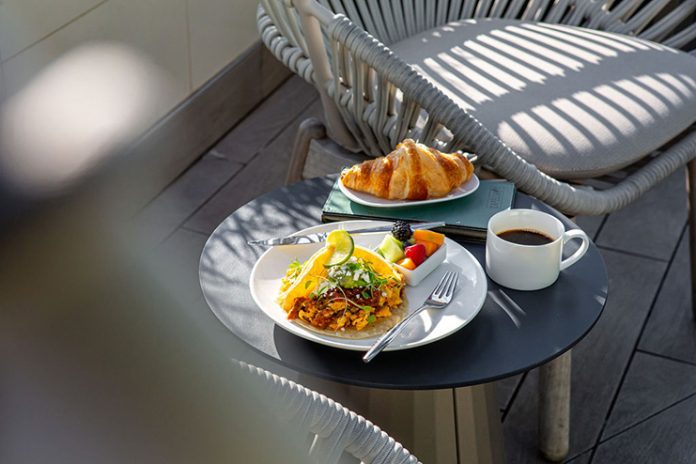For many travelers booking hotel stays, complimentary breakfast remains a mainstay offering. But without streamlined operations and strategic procurement practices, this valued amenity can put a drain on hotel profitability. LODGING Back of the House caught up with four seasoned hotel F&B and operations leaders to discuss how hotels can offer free breakfast without breaking the bank.
Dean Wendel, vice president of food and beverage at Concord Hospitality Enterprises, pointed out that many brands are built on complimentary breakfast. While the industry saw some flexing of traditional breakfast offerings during the pandemic, when owners of branded properties had more opportunities to adapt to the changing circumstances, brands are once again pushing their pre-pandemic standards. But since then, energy rates, wages, and supply costs have risen, and owners and operators are reckoning with how they can manage the costs of complimentary breakfast without raising room rates. “We can’t just eat it—no pun intended,” Wendel quipped.
Jess Hayden, vice president of operational excellence at McKibbon Hospitality, said hoteliers may need to get creative to deliver free breakfast cost effectively, and that starts with analyzing specific items the property is purchasing. “[We’re] making sure that we’re meeting the brand standards but being creative in what days we’re putting certain items out [for] breakfast,” she explained. “We know our mix of business that’s in house, whether it’s feeding a hungry sports team versus a business traveler, and we know what type of product is going to give guest satisfaction, but not break the bank.”
Hotels can more effectively control the costs of complimentary breakfast by making the most of their existing partnerships with group purchasing organizations (GPOs). Wendel said Concord works closely with its purchasing program and takes advantage of monthly optimization reports analyzing spend across the portfolio and identifying opportunities for hotel teams to switch products and save money. “You’re stacking nickels to maintain margins, which has been incredibly difficult, with wages and the cost of food and equipment up,” Wendel explained. Big picture, even stacking nickels can produce measurable savings in a business with such tight margins.
Hayden also emphasized the importance of analyzing reports from GPO partners and sharing those insights with teams in the field to maximize purchasing. She added that hoteliers should consider how they can streamline distribution to decrease delivery costs and secure better pricing; for instance, consolidating orders into one truck that drops once or twice a week versus daily. Hayden shared that McKibbon is also focusing on minimizing the cost of disposables and reducing food waste. “We’re paying attention to not overproducing food, buying the right amounts, and not creating a lot of waste. Nobody makes money when food is going in the trash.”
Also, be diligent when receiving highly perishable items. Don Falgoust, principal of Spot On F&B Services Group, said costs start not with what’s on the invoice but with the actual yields. “If you’re receiving a case of strawberries and not looking through and even tasting them, you don’t know what you’re going to get,” Falgoust explained. It pays—or in this case, saves—to be a squeaky wheel and hold suppliers accountable for quality. “They don’t want to send another truck out later in the day with replacements,” Falgoust pointed out.
Jim Myers, executive vice president operations for Hay Creek Hotels, Resorts and Restaurants, said that in addition to purchasing and receiving quality products, it’s important to implement focused training so culinary teams are versed in the production buffet or continental-style breakfast. “We also want to ensure the property has the proper storage and serving equipment that can extend the shelf life of products,” Myers added.
Food quality and attentive service go hand-in-hand to deliver a complimentary breakfast that meets guest expectations. As Falgoust put it, “If you miss either one of those notes from the song, that record doesn’t sell.” Wendel noted that staff who anticipate guest needs—even in small ways like pre-clearing tables and replenishing water—have a significant impact on the guests’ experience. Likewise, small missteps—like running out of coffee cups—can quickly turn the experience into a negative one.
“Be proactive with these areas you have to maintain, keep clean, and keep fully stocked—but not overstocked,” Wendel warned. “You don’t want to over-prep. You need to replenish thoughtfully.” It may be that the perception of freshness matters just as much as the taste. “There’s nothing worse than opening up the chafing dish and you can tell when the eggs have been there for 30-45 minutes,” Wendel described. “They’re not mixed up; it’s one big mass.”
Service is important, but hospitality is the differentiator, noted Myers. “As guests start their day, it can create a lasting memory of the overall hotel experience when the breakfast associates are truly engaged in hospitality behaviors. It separates us from other hotels,” Myers said. “If we decide to offer complimentary breakfast, it is all about exceeding the guest expectations and creating an early morning surprise beyond just coffee and a muffin.”










